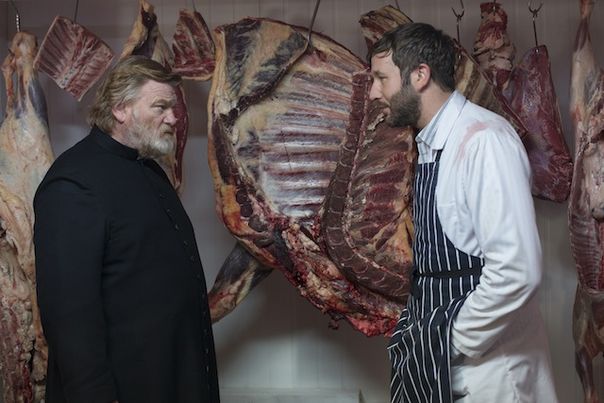Preaching to the Pulpit
Daria Lisitsina of the 2014 Talent Press reviews the black comedy CALVARY, which features in the Berlinale Panorama.

John Michael McDonagh's CALVARY
John Michael McDonagh, renowned director Martin McDonagh's (IN BRUGES) sibling, is in some ways not doing himself any favours by working within the same genre of black comedy in which his brother has established his distinct, sobering style. John McDonagh's second feature CALVARY runs in the Berlinale Panorama. The all too easily lovable tragicomedy set in an Irish village suffers from inevitable, but not unwarranted, comparisons to cult film IN BRUGES. The opening scene of a priest reacting rather light-heartedly to being threatened with arbitrary murder during confession establishes a tone of absurdity from the outset, declaring its intention a tad too eagerly and directly to successfully seduce.
Where IN BRUGES emanates effortless cool, CALVARY tries too hard to be cute. The former's understated absurdity is unsettling, whereas the latter's flips too abruptly from the stand-up comic to the intimately confessional to feel threatening. CALVARY is chockfull of stock caricatures and stars every single iconic Irish actor with nonchalantly floppy hair. Chris O'Dowd plays an inept tortured maniac; Dylan Moran plays his dream role, a filthy rich divorcee – the kind of stereotype Dylan Moran gets off on ridiculing in his own comedy sketches. Brendan Gleeson, star of IN BRUGES, gives a characteristically nuanced performance. His priest has, for the most part, both depth and a sense of humour – the only three-dimensional character in the film. Although the narrative arch charts the build-up to a threatened murder, this plot heaver turns out to be a footnote to what the film really follows: the priest making his rounds talking to the villagers, giving snapshots of individual character's trials and tribulations. CALVARY feels like a series of vignettes that would have made charming short films in themselves, but are too sketchy in a drama that sees itself as a grand fresco of village life in its forced attempt to join the floating dots. It's more of a mosaic; one that is a hotchpotch of knick-knacks from the cultural pawn shop.
In one of the dialogue quips casually littered throughout the film, an old alcoholic writer, who serves no purpose other than delivering sardonic platitudes, announces: “My whole life is an affectation.“ To which the weary priest replies: “That sounds like one of those lines that are suppose to be witty, but don't actually mean anything.“ What an apt, unwittingly self-referential comment on the film itself – a film that is begging to be called quirky.

